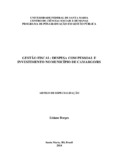| dc.contributor.advisor | Lopes, Luis Felipe Dias | |
| dc.creator | Borges, Lisiane | |
| dc.date.accessioned | 2017-07-12T14:50:47Z | |
| dc.date.available | 2017-07-12T14:50:47Z | |
| dc.date.issued | 2014-08-22 | |
| dc.date.submitted | 2014 | |
| dc.identifier.uri | http://repositorio.ufsm.br/handle/1/3095 | |
| dc.description | Artigo (especialização) - Universidade Federal de Santa Maria, Centro de Ciências Sociais e Humanas, Curso de Especialização em Gestão Pública, EaD, RS, 2014 | por |
| dc.description.abstract | The staff expenditure represents a significant value in the municipal budgets, many times
damaging the offer of basic services and the attendance to the social demands. In this context,
the Fiscal Responsibility Law comes to discipline the expenditures and become clearer the
using of public resources. In this way, the article’s aim is to analyze the fiscal management in
terms of staff expenditure and the Fiscal Responsibility Law’s limits and its relation with
investments in the city of Camargo, between the years 2004 and 2013. The methodology used
was a case study, but it was also utilized a bibliographic and documentary research, besides, it
was used a descriptive and comparative analysis over the last ten years studied. The article explains the public budgets operation, points out the Fiscal Responsibility Law for its
importance in the control of the cities’, states’ and union’s public management, besides, it
contextualizes the city of Camargo and presents the research’s results. The main result, which
was the research’s objective, revealed that there was not interference of the staff expenditure
in the investments. The other results were: the city of Camargo remained in a considerable
security margin in relation to the established limits by the Fiscal Responsibility Law; during
election years the investments have an expressive elevation; the decline in the expenditures
with investment occurs for two reasons – subsequent year to the municipal elections and the
significant increase of current expenditures, consequence of the investments of the previous year. | eng |
| dc.language | por | por |
| dc.publisher | Universidade Federal de Santa Maria | por |
| dc.rights | Acesso Aberto | por |
| dc.rights | Attribution-NonCommercial-NoDerivatives 4.0 International | * |
| dc.rights.uri | http://creativecommons.org/licenses/by-nc-nd/4.0/ | * |
| dc.subject | Gestão fiscal | por |
| dc.subject | Lei de responsabilidade fiscal | por |
| dc.subject | Investimentos | por |
| dc.title | Gestão fiscal: despesa com pessoal e investimento no município de Camargo/RS | por |
| dc.type | Trabalho de Conclusão de Curso de Especialização | por |
| dc.degree.local | Polo de Camargo, RS, Brasil | por |
| dc.degree.specialization | Gestão Pública, EaD | por |
| dc.description.resumo | A despesa com pessoal representa um valor significativo nos orçamentos dos
municípios, muitas vezes prejudicando a oferta de serviços básicos e o atendimento às
demandas sociais. Neste contexto, a Lei de Responsabilidade Fiscal (LRF) surge para
disciplinar os gastos e tornar mais transparente a utilização dos recursos públicos. Desta
forma, este artigo tem por objetivo analisar a gestão fiscal no que tange à despesa com pessoal
e os limites da Lei de Responsabilidade Fiscal e sua relação com investimentos no município
de Camargo, entre os anos 2004 e 2013. A metodologia utilizada foi o estudo de caso, bem
como se utilizou pesquisa bibliográfica e documental, além de análise descritiva e
comparativa ao longo dos dez anos estudados. O artigo explica o funcionamento do
orçamento público, destaca a Lei de Responsabilidade Fiscal pela sua importância no controle
da gestão fiscal dos municípios, estados e união, contextualiza o município de Camargo e
apresenta os resultados da pesquisa. O principal resultado revelou que não houve interferência
da despesa com pessoal nos investimentos. Os demais resultados foram: o município de
Camargo manteve-se dentro de uma considerável margem de segurança em relação aos
limites estabelecidos pela Lei de Responsabilidade Fiscal; em anos eleitorais, os
investimentos tem uma expressiva elevação; o declínio nas despesas com investimento
decorre de dois motivos principais – ano posterior às eleições municipais e aumento
significativo das despesas correntes, consequência dos investimentos realizados no ano
anterior. | por |
| dc.publisher.country | Brasil | por |
| dc.publisher.initials | UFSM | por |
| dc.subject.cnpq | CNPQ::CIENCIAS SOCIAIS APLICADAS::ADMINISTRACAO::ADMINISTRACAO PUBLICA | por |
| dc.publisher.unidade | Centro de Ciências Sociais e Humanas | por |



